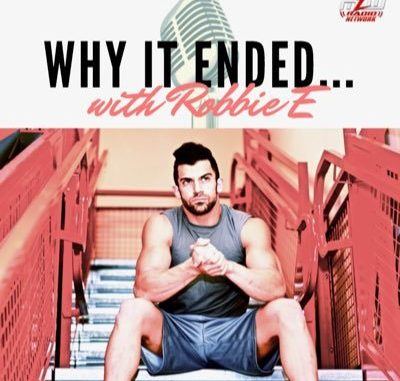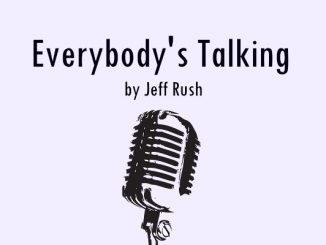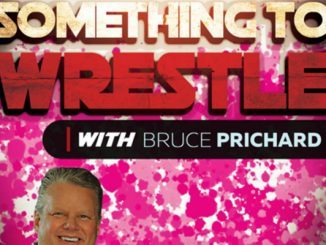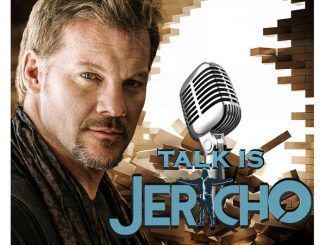
This week’s episode of Why It Ended with Robbie E featured former WWE writer Jimmy Jacobs. Contrary to the podcasts title, the interviews on this show are actually in-depth career retrospectives that walk us through the lives of the subject, from the time they first realized they were wrestling fans, through their careers, to what they’re doing today. Of course, there’s always a focus on why it, in fact, ended, and Jacobs story in that regard was one of the most highly publicized terminations over the past year.
Jacobs was eager to share his story, and even appeared to have pounded a couple iced coffees prior to the show. I thought at numerous times he sounded like a young Chris Jericho, both in inflection and tone and also in that way Jericho exuded passion for everything he did in the mid-to-late 90’s.
Jacobs also had plenty to say about Jericho, having worked with him intimately on his most recent run. Jacobs crafted the List Of Jericho as well as the storyline with Kevin Owens culminating at the Festival of Friendship and here he talked about the reception he received backstage following that segment.
We also got some fun insight into Jacobs childhood days as a fan growing up in Michigan, the “freaky Friday” switcheroo that saw his wrestling-obsessed older brother become a mathematics professor while Jacobs, a math savant as a child, become a pro wrestler, and the perceived disappointment his career path has provided his educated, federal judge father.
The thing that stood out to me the most in this interview was the mention of three specific wrestlers. Each was in a completely different context, but provided valuable insight as to who Jimmy Jacobs is, what his time writing for WWE was like, and ultimately, why it ended.
1. Ryback. Of the three names, this was the biggest throwaway in regards to how Jacobs mentioned them, but also served as a specific example of what separates independent wrestling culture from the WWE bubble.
Looking back on old tapes of himself, it occurred to Jacobs that it was so valuable for him to break in at a time “when nobody knew what the f**k they were doing.” He felt he got to develop on his own and never asked anyone how to be Jimmy Jacobs. He says that’s how wrestlers develop on the independent scene.
In WWE, it’s the job of numerous people to tell the wrestlers what they’re doing right or wrong and where changes need to be made. He says the reality is that no one has the answers and if they tell you they do, they’re working their own agenda.
“There is no formula to how to make stars. If there was, Ryback would be the biggest star in the business right now,” he says.
Jacobs time in WWE paralleled Ryback’s for just over a year in 2015-16. In fact, two months after Jacobs joined the writing team, Ryback won the IC title, his first championship in WWE. This comment offers a sobering look at how a member of the writing team regarded an emerging talent, acknowledging they never had a chance to become a star even when it was in part their job to produce content for that wrestler.
What I’m saying is not meant to shine a negative light on Jacobs in any way. More so, it ‘s a look at what a screwed up culture in some ways exits in WWE.
2. Mick Foley. At one point, as Jacobs is discussing his first match in WWE, against Eddie Guerrero of all people, co-host Matt Koon asks if, as a smaller performer, guys like Eddie and Rey were the wrestlers he most looked up to. Without hesitation, Jacobs says “No, my guy was Mick Foley.”
He says Foley’s sit down interviews with Jim Ross in 1997 were what did it for him. He identified with Mick being different and not fitting a specific mold. It’s almost funny how emphatic Jacobs is with this. He even drives it home again, stating “From that moment on, Mick Foley was my guy and I’ll say at 34 years old, Mick Foley’s still my guy.”
Of course, writing for WWE and getting the chance to work with Foley would provide the opportunity for Jimmy to grow disillusioned. So how did that go? Jacobs loved that too. “It just reminded me of why I liked him at 14,” he says.
Jacobs recalled the promo Foley cut when Stephanie forced him to fire someone on an episode of Raw. As Jacobs watched Foley exude vulnerability and realism while firing Stephanie, he thought again “That’s my guy.”
“Even if I wasn’t a Mick Foley fan at 14, I would’ve been a Mick Foley fan at 32,” says Jacobs.
3. Michael Hayes. Jacobs’ admiration for Hayes in his early days with the company would prove immensely prescient. He says what he saw in Hayes illustrated for him what he yearned to achieve.
“All I ever wanted to be when I first got there was Michael Hayes. All I wanted to do was be able to be me.”
He notes that in a culture where standing out will earn you the scorn of Vince McMahon, Hayes being good at his job allowed him to dress however he pleased.
During his tenure on the writing team, Vince would admonish Jacobs for his hair and clothing decisions. He even recalled a time during a meeting when he made a suggestion to Vince. Rather than respond directly to Jacobs, Vince instead leaned in and muttered something to Jacob’s boss, Ed Koskey. Jimmy didn’t know whether Vince thought his idea was bad or what the issue was. He found out later, Vince had told Koskey he disliked Jimmy’s tie and felt that he dressed too gimmicky.
It’s confounding in an industry that celebrates the amplification of personality and over the top behavior, celebrating glitz and glamour and outlandishness to the highest degree that the factory making the sausage is operated as tightly as a monastery where members of the crew are nitpicked, ridiculed and reprimanded for being individuals and having a perceived unwillingness to conform.
It’s ultimately what soured Jacobs on working for WWE, as he longed to be himself. He even reveals that he had his ears re-pierced just hours before being let go by WWE, proving in a perverse way, that both sides were in fact on the same page.
Jacobs also talks about his time in Ring Of Honor, meeting CM Punk, and working with Kevin Owens and Sami Zayn. Of course, he also describes how the posting of his picture with the Bullet Club went down and would eventually lead to his termination. To check out the full interview, visit Why It Ended with Robbie E.
You can follow Jeff Rush on Twitter @jefflikesstuff
Please credit PWPodcasts.com when using any portion of this article.




Be the first to comment